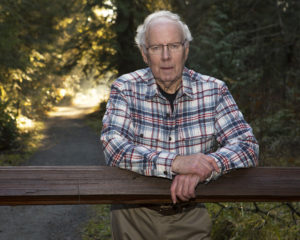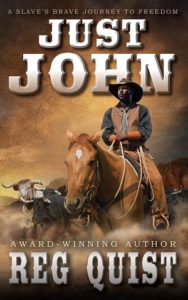 An Interview With Reg Quist
An Interview With Reg Quist
by Patience Bramlett
CKN Christian Publishing: A true love of writing must drive you! So, why do you love writing?
Reg Quist: In a way, the question demands the same answer as why do I love my wife, my kids, my grandkid? There is no definable reason. I just do.
When I was a young man, I had the urge to write. But between a lack of self-confidence in my writing ability, and a growing family that I had to support, the urge was suppressed for many years. Later in life, when the kids were on their own and my time allowed, I played with writing, experimenting with several styles and genres before realizing that the western novel was where my heart lay. With retirement came the time to put more effort into writing.
To give a more specific answer to the question I would have to say that writing provides the opportunity to entertain while, at times, informing and encouraging and causing the reader to think. I want my stories to be realistic. The typical Hollywood inspired western superhero fast gun holds little interest for me. Hopefully, when the last page is turned in one of my books the reader can legitimately say, “That could have really happened.”
CKN: How has God influenced your writing?
RQ: Tough question. The blanket answer would be that God has influenced all of me.
I believe that, doctrinally, when God gifts us a new heart through Jesus Christ, he renews our very being. That would include our minds. Ideally, that renewed mind will allow my ego to be set aside, and I can concentrate on the story and the eventual reader and forget about myself. To aid in this I never write myself, my family, or my friends into a story. That’s just not going to happen.
While good sales or good reviews are very gratifying, I am more apt to stand in amazement at those facts, rather than allow my ego to get out of control.
Each morning when I close my Bible after a time of personal worship I pray simply, “Lord, help me with my writing”. Although I wish He would help me more, especially through the tough parts, I never feel like I am totally alone. And hopefully, the reader will know that God is acknowledged and revered throughout the story, even though the references are modest and non-intrusive.
CKN: Every author has a process, and we’re curious about yours—how did you first come up with the idea to write Just John?
RQ: I have wanted to write about John for several years. He is a very well-known historic figure in Alberta Cattle Country. His life story is worth the telling. Unfortunately, John left no real biography behind him. Little is known about his background, his family, or his life as a slave. These problems, and my work on other stories pushed John further into the background. But finally, I decided I had to do it.
Just John is largely fiction. The follow-up story will be largely historic fact. Some call that faction, although I am not sure if I like the term.
I felt John needed a background, if for no other reason, to try to dig a bit into the life and times of a man recently released from slavery. And to see that life through a writer’s eyes who has no axe to grind. A century and a half after the fact, and with no one living today that has personal (North American) slave experience, it is nearly impossible to understand how an illiterate, unskilled man or woman managed to move into freedom and self-reliance. Even leaving racism aside for a moment, the challenges must have been enormous. And yet, here lives this man called John Ware, successfully merging into the early cattle and cowboy culture in both the US and Canada, and doing it successfully with no government programs, no one lifting him up, simply doing his work and earning great respect in the doing of it.
John needed a background. So, I gave him one. My hope is, of course, that the reader will see a smooth transition from the somewhat fictitious 1882, at the conclusion of Just John, to historically true 1892 in the sequel of John’s story. And if the true, historic John is better known and understood when the stories are told, that alone will justify the time and energy put into the writing.
CKN: Can you share with us something about Just John that isn’t in the blurb?
RQ: Well, there is nothing in the blurb about the many hours of research that went into trying to get the tale accurate. But, of course, that is not what you’re really asking.
The point of the fictional background that Just John gives to John Ware is to paint a picture of how a recently released slave “might” have found his way into the cowboy culture. It’s meant to be a transition piece from slavery to success and respect, a path John clearly traveled, whether we know his exact story or not. At the end of John, I tried to emphasize that simply accepting what came along wasn’t going to get John what his heart desired. He had to have a ‘want’. Everyone has to have a want, but could a slave think that way? I wanted John’s answer to that question to, eventually, be ‘yes’.
CKN: What was the hardest scene to write? No major spoilers!
RQ: Probably when John left the slave farm, saying goodbye to family. He had to know he would never see them again. It took enormous trust to ride off knowing he could be arrested for horse theft, or worse, as an escaped slave, if the letters the owner gave him didn’t say what he was told they said.
The temptation was to detail out the parting, to get emotional, maudlin almost, with a crying mother, stoic father and wondering siblings. I struggled with that before I finally kept it short. I only want to write what furthers the story, and the family’s parting could easily have become a foolish rabbit trail that was best to avoid.
CKN: What were some challenges you faced when writing Just John?
RQ: Trying to grasp something of the culture that, obviously, I didn’t live through.
Getting the geography and terrain correct in an area I am not familiar with.
Somewhat butchering the language. It is a historically recorded fact that John never did capture the correct pronunciation of many words. I felt it was necessary to hold to that known fact. It’s far more difficult to write misspelled words and to keep the misspelling consistent throughout the story than it is to write correctly.
To write an interesting tale with going ‘Hollywood’.
CKN: What do you hope your readers take away from this book?
RQ: It’s altogether too easy to read historical accounts and forget that the one you are reading about had thoughts and feeling, likes and dislikes, heartaches and successes. And, in all likelihood, people he loved and who loved him.
How does it feel to be rejected in the culture that said you were now free? How does a person work through that?
Perhaps most of us can remember our last day of school when we knew that the next morning we were to venture out, on our own, to take up work and to have no one to lean on. Now, multiply that feeling by what, a hundred, a thousand? That just might be the feelings a slave had when he ventured out on the first day of freedom. Much has been written about the racism involved but not much about the concept of finding usefulness within the new freedom. I’m hoping I have a bit better understand myself, after doing the writing and that the reader will have a bit better understanding after the reading is done and the book closed.
CKN: Writing can be an emotionally draining and stressful pursuit. Any tips for aspiring writers?
RQ: Many people have said it – just start. And keep going.
Most of the emotional draining is coming from fear. The fear is within yourself. No one else knows about it. So, push it aside and put some words on paper. They won’t all be good words. Many will be edited out and replaced. Get over yourself. We all edit and take out words or sentences or whole thoughts before we have a finished product.
Wrapped up in emotions? Write those emotions into the appropriate story character. Feeling the events one character is living through? Enjoy the experience. You wrote it – enjoy it.
I’m a private person. I seldom talk about what I am writing. If you feel you absolutely must talk about it make sure the one you talk with is truly on your side. Leave the doubters to go their own way.
CKN: Last but not least—if you had to describe yourself in three words, what would they be?
RQ: Old and plodding.

